|
|
Custom Doors Custom Wood Doors Custom Teak Doors
Custom Carved Doors Custom Made Doors by The-Wood(R) |
|
| Home |
Custom Door >
Design >
Projects |
The-Wood® Studio is a custom door designer
and manufacturer of custom entryways made to order. We make
unfinished, pre-finished and finished doors with and without frame. We
specialize in custom carved residential doors with French, Mexican,
English,
Victorian, Classic and Moroccan carving design. We carve crests,
coat of arms, logos, names, horses and dogs... We make custom
entryways in any style, size, thickness, shape and design... We
offer wide range of custom designs, unique carving and one of a kind
ornaments.
 |
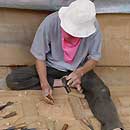 |
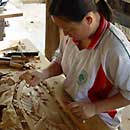 |
|
Gothic Custom Door |
Custom Made Door |
Custom Design Door |
Today, an increasing
portion of Teak comes from government-managed plantations. Each door
has a Forest Stewardship Council (FSC) Chain of Custody (CoC)
certificate to guarantee the source was a sustainable plantation...
|
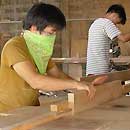 |
 |
 |
|
Custom Wood Door |
Custom Teak Door |
Oversize Custom Door |
The FSC is a
non-profit organization whose members include environmental and
social groups, and progressive forestry and timber related companies
who work together to improve global forest management...
 |
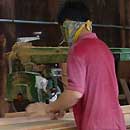 |
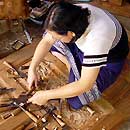 |
|
Custom French Door |
Custom Interior Door |
Custom Exterior Door |
Top Grade Kiln-Dried
Teak
:: we
use only premium grade teak. Many other manufacturers use secondary
quality wood including sapwood. Your doors will be made from kiln-dried
teakwood. The wood is kiln dried for 2 weeks to a moisture content of
10-12% and has an additional week or so of "resting" to allow the wood
to reabsorb moisture in the air. This process ensures that the wood
regains its dimensional stability and will not warp or split. This
critical stage of reabsorbing moisture allows the doors to withstand the
rigors of climatic change.
FSC endorsement of a
product indicates that the wood used to make it comes from a source
that has been certified by the FSC as being well-managed and meeting
sound environmental, social, and economic standards.
Teak
:: tall deciduous tree ( Tectona grandis ) of the family Verbenaceae
( verbena family), native to India and Malaysia but now widely
cultivated in other tropical areas. Unfortunately, the wood of
plantation teak is considered inferior to that of wild teak;
consequently the wild populations are being decimated. Teakwood is
moderately hard, easily worked, and extremely durable; beams said to
be over 1,000 years old are still functional. The wood contains an
essential oil that resists the action of water and prevents the
rusting of iron. The heartwood is resistant to termites. Teak is
superior to all other woods for shipbuilding and is also used for
furniture, flooring, and general construction. Several other similar
woods from unrelated trees are sometimes also called teak. Teak (
Tectona grandis ) is classified in the division Magnoliophyta ,
class Magnoliopsida, order Famiales, family Verbenaceae.
Door
Factory :: place of production characterized by wage labor,
the use of machinery, and the division of labor. The large-scale use
of machinery differentiates factory production from simple
manufacture, and the division of labor sets it apart from even the
most elaborate handicraft establishments. Standardized goods are
produced and sometimes sold more cheaply by the factory system, and
occasionally the goods are better than those made by artisans. The
factory system makes possible huge increases in output per man-hour
though at the same time division of labor deprives individual
workers of much of their sense of creativity. However, in the 19th
and first half of the 20th cent., the factory system gave rise to
serious social problems, some of which persist. The tedious routine
of assembly line work resulted in boredom and frustration among the
workers; this could reduce productivity and product quality. The
concentration of large plants and factories in urban areas also
helped create urban congestion, pollution, slum dwellings and
traffic jams. To minimize these problems, employers have attempted
to increase productivity and quality of product by introducing
robots to perform some of the tedious operations, by introducing
systems that reduce the tedium of assembly line work, and by
involving workers in the plant management. Since the 1960s, the
closing of factories in urban areas in the United States has reduced
environmental pollution and other social problems associated with
factories, but has also created decreased employment opportunities
for unskilled workers. Since the 1960s, factory production has been
globalized, creating goods that are assembled in more than one
country. Global production has also induced multinational
corporations to move their factories out of industrial countries to
areas with lower overhead and cheaper labor. Because of the
importance of factories to an area's economy, local governments in
the United States have offered subsidies to encourage companies to
build or maintain factories in their areas. In 1988, Congress passed
legislation requiring large employers to provide notice before
closing a plant.
|




